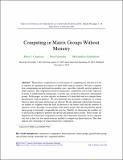Computing in matrix groups without memory
Abstract
Memoryless computation is a novel means of computing any function of a set of registers by updating one register at a time while using no memory. We aim to emulate how computations are performed on modern cores, since they typically involve updates of single registers. The computation model of memoryless computation can be fully expressed in terms of transformation semigroups, or in the case of bijective functions, permutation groups. In this paper, we view registers as elements of a finite field and we compute linear permutations without memory. We first determine the maximum complexity of a linear function when only linear instructions are allowed. We also determine which linear functions are hardest to compute when the field in question is the binary field and the number of registers is even. Secondly, we investigate some matrix groups, thus showing that the special linear group is internally computable but not fast. Thirdly, we determine the smallest set of instructions required to generate the special and general linear groups. These results are important for memoryless computation, for they show that linear functions can be computed very fast or that very few instructions are needed to compute any linear function. They thus indicate new advantages of using memoryless computation.
Citation
Cameron , P J , Fairbairn , B & Gadouleau , M 2014 , ' Computing in matrix groups without memory ' , Chicago Journal of Theoretical Computer science , vol. 2014 , 8 . https://doi.org/10.4086/cjtcs.2014.008
Publication
Chicago Journal of Theoretical Computer science
Status
Peer reviewed
ISSN
1073-0486Type
Journal article
Rights
© 2014. Peter J. Cameron, Ben Fairbairn, and Maximilien Gadouleau. Licensed under a Creative Commons Attribution License (CC-BY).
Description
Funding: UK Engineering and Physical Sciences Research Council award EP/K033956/1Collections
Items in the St Andrews Research Repository are protected by copyright, with all rights reserved, unless otherwise indicated.

